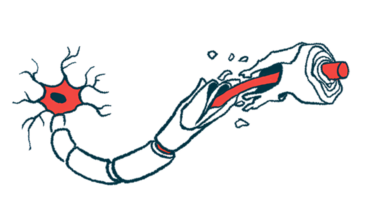Final Data Likely Soon in Phase 2 Trial of Temelimab for Relapsing MS

A Phase 2 clinical trial into the safety and tolerability of higher-dose temelimab as a potential therapy for relapsing forms of multiple sclerosis (MS) is now complete, and top-line data is expected by late March, its developer, GeNeuro, announced.
The ProTEct-MS Phase 2 trial (NCT04480307), conducted at the Karolinska Institutet’s Academic Specialist Center in Stockholm, investigated temelimab, at higher doses than previous trials, in 40 people with relapsing MS and evidence of disease progression in the absence of relapses.
“With the completion of patient visits in the ProTEct-MS trial, we now look forward to reporting out the efficacy and safety results by the end of March,” David Leppert, MD, chief medical officer of GeNeuro, said in a press release.
Temelimab is a monoclonal antibody that targets the envelope protein of the human endogenous retrovirus (HERV) W, called pHERV-W. This family of viruses is thought to account for about 8% of the human genome due to viral infections occurring over several million years. While most proteins coded in these viral genes are tolerated in humans, re-activation of pHERV-W can induce pro-inflammatory responses and has been associated with MS.
By neutralizing pHERV-W, temelimab is expected to prevent the inflammatory responses that cause damage to the myelin sheath, a fatty substance that covers and protects nerve fibers.
CHANGE-MS (NCT02782858), a previous Phase 2 trial, and its open-label extension study ANGEL-MS (NCT03239860) investigated three doses of temelimab – 6, 12, and 18 mg/kg — versus a placebo in 219 people with relapsing-remitting multiple sclerosis (RRMS).
Results showed that two years of treatment with the highest dose slowed disability worsening, reduced the loss of brain volume, and preserved myelin. However, CHANGE-MS did not meet its primary goal of lesser neuroinflammation, with doses used in these trials considered “conservative” by researchers.
ProTEct-MS, designed to investigate temelimab at higher doses, enrolled participants who were experiencing disease progression without relapses after at least one year of routine rituximab treatment. Of note, rituximab is an antibody therapy that kills B-cells, a type of immune cell involved in the damaging inflammation in MS.
Participants were randomly assigned to one of three temelimab doses — 18, 36, or 54 mg/kg — or to a placebo, all given monthly via into-the-vein infusions for 48 weeks (about one year).
This Phase 2 trial’s main goal is to determine the safety and tolerability of the higher doses, as determined by the number of adverse events. Secondary goals include evaluating changes in brain volume, myelin integrity, and in the number of brain lesions.
An open-label extension of ProTEct-MS, which enrolled its first participant in September, is ongoing to gain more insights into the long-term neuroprotective effects of temelimab at higher doses.
“We would like to thank all the trial participants for their time and commitment to this important research effort, especially in the difficult circumstances of the past two years. We are also very grateful for the Karolinska/[Academic Specialist Center] team’s dedication and commitment as we now work towards the disclosure of the results,” said Leppert.
GeNeuro also noted that it has sufficient funds for planning and potentially launching a Phase 3 trial of temelimab in MS should ProTEct-MS data support continued development.
“In July 2021, we completed a €6 million private placement to extend GeNeuro’s financial visibility into 2023, providing us sufficient time to facilitate Phase 3 planning and partnering discussions following the results from our Phase 2 clinical trial of temelimab in MS,” said Miguel Payró, chief financial officer at GeNeuro.







